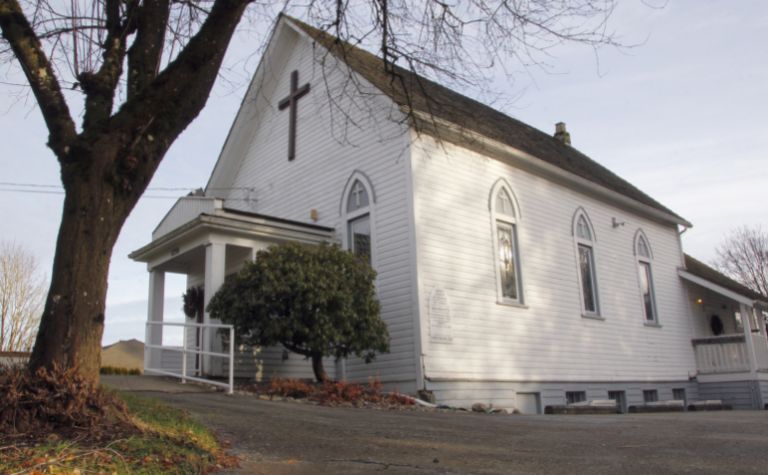There are many different kinds of Christian churches today. Some of them have the name “Methodist” or “Evangelical” in the title. Most people know that the terms describe Christian churches but are unsure of the similarities and differences between the denominations or traditions.
Methodist and evangelical churches each belong to the Protestant branch of the Christian faith. Methodism arose out of the Church of England in the 18th century. Evangelicalism is a conservative movement that grew out of opposition to liberal teachings in the first half of the twentieth century.
What is the origin of Methodism and Evangelicalism? What do their names mean? What is each other’s theological and social worldview? How do their beliefs about Jesus Christ, the Bible, and salvation compare? Keep reading to learn the answers to these questions and others.
Also, see What’s the Difference Between Methodists and Catholics? to learn more.

Methodist and Evangelical Churches: Differences
Methodists and evangelical Christians have much in common regarding each tradition’s historic beliefs and practices. It’s even possible to be an “evangelical Methodist,” which many conservatives in the Wesleyan tradition are.
However, many Methodist denominations and churches have adopted liberal theological and social viewpoints in recent years, widening the gap between them and conservative evangelicals.
| Methodism | Evangelicalism | |
|---|---|---|
| Founder | John Wesley (1703-1791). He was ordained in the Church of England, but later it didn’t welcome him. Known for open-air preaching and an emphasis on sanctification after salvation. | Evangelicalism doesn’t have a single founder. Instead, the movement consists of multiple denominations and churches. |
| Origin | 18th-century England. Wesely wanted to lead a spiritual reformation within the Church of England, but it rejected his unconventional movement. | The modern use of the term originated in the 20th century. It’s distinguished from liberalism and fundamentalist movements. Fundamentalism has similar theology to evangelicalism because both movements have a high view of Scripture. |
| Name | People referred to members of Wesley’s spiritual formation club at Oxford as “Methodists” because of their emphasis on processes or methods to promote Christian maturity. | The word “evangelical” comes from the Greek word euangelion meaning “gospel” or “good news.” The term describes a gospel-centered or cross-centered worldview. |
| Branch | Methodism is Protestant. | Evangelical is Protestant. |
| Methodism | Evangelicalism | |
|---|---|---|
| Early influencer(s) | Other than John Wesley, Charles Wesley (1707-1788) and George Whitefield (1714-1770) played key roles in the denomination’s formation. | English preacher Charles Spurgeon (1834-1892), American preacher Dwight L. Moody (1837-1899), Billy Graham (1918-2018), and many others. |
| Significant writing outside the Bible | The Apostles’ Creed, The Nicene Creed; Wesley edited the 39 Articles of Religion, removing the Calvinist teachings in it; he also edited the Book of Common Prayer after the Revolutionary War; the United Methodist Hymnal | Evangelicalism values the same writing important to Protestantism in general, including the numerous works that emphasize a gospel-centered approach to evangelism, missions, biblical interpretation, and more. |
| Organization | The term “connectionalism” describes the network of relationships among Methodist churches. “Bishops” lead churches within the framework of Episcopalian polity. | Evangelicalism consists of numerous denominations and even non-denominational churches. Evangelical churches can have congregational, presbyterian, or episcopalian church government. |
| Divisions | There are many denominations in the Methodist tradition. The United Methodist Church (UMC) is the largest. The African Methodist Episcopal Church (AMEC) is the second largest. | Churches in any denomination can be called “evangelical” if they centralize the gospel and emphasize other characteristics of the movement, such as valuing conversions and applying their faith through social causes like caring for the poor, widows, and orphans. |
| Theological and social worldview | It depends on the denomination. Many churches in the UMC denomination have adopted liberal perspectives on many social and theological issues in recent decades. Other smaller denominations maintain conservative positions, such as the Evangelical Methodist Church (EMC). | Historically, evangelical churches are conservative theologically and socially; in recent years, some self-identifying evangelical churches have drifted from conservative theology and adopted modern social values on a variety of issues. |
Also, see What’s the Difference Between Methodists and Lutherans? to learn more.

Methodist and Evangelical Beliefs
| Methodism | Evangelicalism | |
|---|---|---|
| Theology | As Protestants, Methodism has historically taught that salvation is by grace through faith in Jesus Christ and not according to works. Liberal Methodists may diverge from these doctrines. Their doctrine is sometimes called “Wesleyan theology” or “Wesleyan-Arminian theology.” | Evangelicals are also Protestant. The movement is largely conservative, but some churches and individuals are adopting liberal views on various issues. The term “evangelical” casts a wide net within Protestantism. |
| God | Methodists believe in the Trinity; i.e., one God exists in three persons, Father, Son, and Holy Spirit. | Evangelicals are also committed Trinitarians because they believe the Bible teaches the doctrine. |
| Jesus | Methodists have traditionally believed that Jesus is God. | Evangelicals believe that Jesus is God. |
| Holy Spirit | Methodists have traditionally believed that the Holy Spirit is God. | Evangelicals have the same core beliefs as other Protestants about the deity of the Holy Spirit. |
| Bible | The Bible is inspired according to traditional Methodist teaching. Some conservative Methodist denominations in America accept and use the term “inerrancy,” which means that Scripture is without error. | Historically, all evangelical churches have a high view of Scripture, even if they don’t always use the terms “inerrancy” and “infallibility.” |
| View of the atonement | Conservative Methodists believe Christ died in place of sinners and as a punishment for their sins. Liberal Methodist denominations and churches view Christ as a martyr and his death as a form of activism for marginalized people. | Historically, evangelical churches teach the penal-substitutionary atonement of Christ. This means he took people’s punishment for sin and their place on the cross. |
Also, see What’s the Difference Between Methodists and Baptists? to learn more.

| Methodism | Evangelicalism | |
|---|---|---|
| Salvation | Methodists are Arminian, as opposed to Calvinists or Reformed. | Evangelicals can be Arminian, Calvinist, or something else. |
| Spiritual gifts | Some Methodists are cessationists; others are continuationists. Pentecostal expressions have been associated with revivalism in the Methodist tradition, which has historically been a topic of internal debate and tension. | Pentecostals and non-Pentecostal denominations, churches, and individuals are part of evangelicalism, resulting in a variety of perspectives. |
| Ordinances | Baptism and the Lord’s Supper | Baptism and the Lord’s Supper |
| Baptism | Pastors baptize infants as a sign of regeneration. Adult converts can be baptized, often by sprinkling. | Evangelical churches may practice “Believer’s Baptism,” which means they only baptize adults or paedo-baptist (paedo = “child”), which means they baptize children. |
| Communion | Methodists believe in the real presence of Christ, making the bread and cup more than a mere memorial, like in some Protestant traditions. | Evangelical churches have a variety of views on the Lord’s Supper. For example, some hold to consubstantiation; others believe in the real presence of Christ; another group believes the bread and cup are memorials. |
| Eschatology | The Second Coming of Christ is a primary doctrine. Methodists interpret the millennium according to Amillennial theology. This means it interprets the 1,000-year period described in Revelation 20:1-6 figuratively and defines it as the time between Christ’s first and second coming (i.e., the Church Age). | Evangelical churches may be Premillennial, Amillennial, Post-Millennial, or something else. All evangelicals believe in the Second Coming of Christ. |
Also, see What’s the Difference Between Methodists and Anglicans? to learn more.
References:
[1] Source
[2] Source
Related Questions
Explore the rich diversity of Christian denominations. Learn how varied beliefs, practices, and traditions shape the Christian faith. Understanding these differences can deepen your insight into...
Christianity is an important part of the American story in its various denominational expressions. Some denominations came to America from Europe, while others started on American soil. The size of a...
